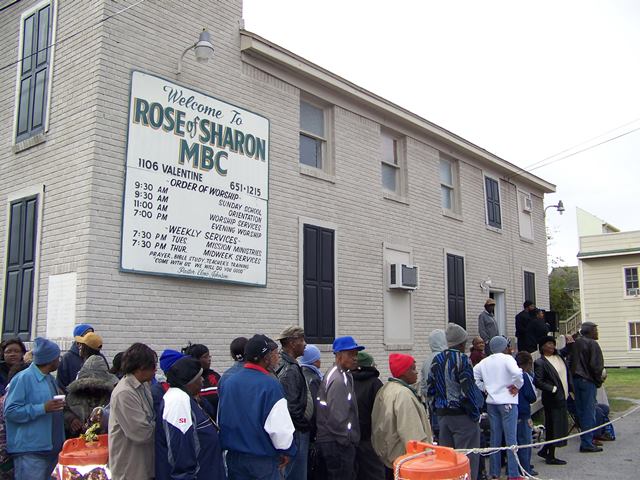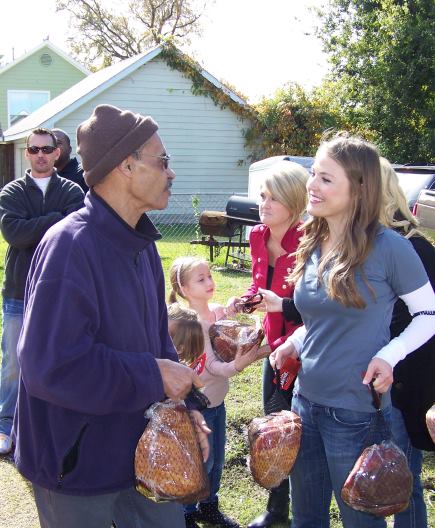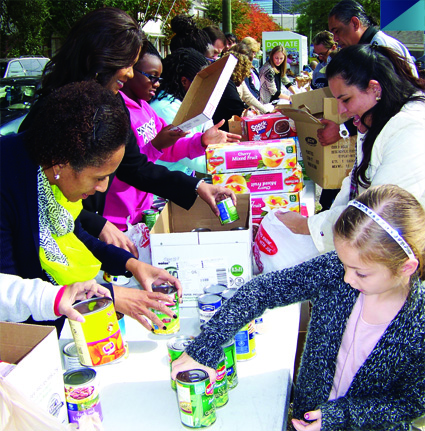By Ken Camp
Elmo Johnson rejects any personal credit for transforming Houston’s 4th Ward since he arrived as pastor of Rose of Sharon Missionary Baptist Church 30 years ago. But he’s eager to give God the glory.
“The Lord has done some great things here,” Johnson said.
Three decades ago, drug deals occurred daily on most street corners, and addicts sought shelter in burned-out or dilapidated row houses in the historically African-American community, originally known as Freedmen’s Town.
 “First it was Freedmen’s Town. Then it became the 4th Ward. Now, they call it Midtown,” he said.
“First it was Freedmen’s Town. Then it became the 4th Ward. Now, they call it Midtown,” he said.
Housing boom
Within the last decade, the area began to attract upwardly mobile young professionals who moved into newly built high-rise condos and townhouses. But the market-driven housing boom in the 4th Ward likely would not have occurred without the catalyst Rose of Sharon and its nonprofit community development arm, Uplift 4th Ward, provided.
In 2006, the church, Uplift 4th Ward and a wide variety of ministry partners and volunteers known as “Elmo’s Army” built the 20-unit Crawford W. Kimble Senior Living complex across the street from Rose of Sharon to meet the needs of low-income elderly residents. Next, Uplift 4th Ward and its partners built additional housing in the area for low- to moderate-income residents.
The construction company that built the senior living center — Trammell Crow Residential — continues to work in partnership with Rose of Sharon, providing hams the church distributes to its neighbors each Thanksgiving.
Racial reconciliation
Weeks before the most recent ham distribution, Johnson invited officers with the Houston Police Department to participate. Their involvement at the event became particularly meaningful, since it occurred the morning after a grand jury declined to indict a white police officer in Ferguson, Mo., after he shot and killed an unarmed young black man, and that community erupted in rioting.
In contrast, crime has decreased in the 4th Ward in recent years, and Johnson wants to foster good relations between residents and the police officers who serve the area, which hardly resembles the neighborhood he began serving 30 years ago.
 “We’ve seen dramatic improvement. It’s a cleaner neighborhood. Change is difficult, but change is necessary,” Johnson said. “Change has to come. God is a God of change.”
“We’ve seen dramatic improvement. It’s a cleaner neighborhood. Change is difficult, but change is necessary,” Johnson said. “Change has to come. God is a God of change.”
When Johnson starts talking about God affecting change, he begins to preach: God brought the people of Israel out of slavery in Egypt. God parted the Red Sea and led the Israelites across on dry land. God brought them to the Promised Land.
“But when they got to the Promised Land, they had to conquer it. They had to do some work to claim what God promised,” he said. “That’s the way it is in a community. We had to drive the drug dealers out, fix up some old houses and do some conquering in this community.”
Conquest often involves conflict, and Rose of Sharon initially faced some resistance as it sought to bring change to its historic neighborhood. However, as the church continued to meet needs in the 4th Ward, it earned respect.
“Keep doing what is right for the sake of people, and they will see that you mean good for all the community. This church has never been broken in. When you feed people and clothe people, the people respect that, and they know we’re here for their best interests,” Johnson said.
Because of the reputation Rose of Sharon has earned in the Houston area, several suburban churches send volunteers and financial assistance to help the inner-city congregation in its community ministries. Those ministries include serving meals to homeless people twice a week and operating an ongoing benevolence program that offers food and clothing to any who need them.
“One thing we’ve learned is that you may not have the resources yourself, but God will open a door,” Johnson said. “Our motto is, ‘We love people.’ We want everyone to feel loved and wanted.”
Cooperation rather than competition
That involves working in cooperation rather than in competition with other churches, Johnson said, noting particularly Rose of Sharon’s close working relationship with other predominantly African-American churches throughout Houston.
 “There’s a lot of work to be done in this community,” said John Wilburn, pastor of the Greater New Hope Baptist Church in Houston, as he prepared to help with a food distribution project at Rose of Sharon. “These are people made in God’s image.”
“There’s a lot of work to be done in this community,” said John Wilburn, pastor of the Greater New Hope Baptist Church in Houston, as he prepared to help with a food distribution project at Rose of Sharon. “These are people made in God’s image.”
In partnership with Union Baptist Association and the Baptist General Convention of Texas, Rose of Sharon has started two congregations on Houston’s south side in the last year.
Johnson believes in equipping members for ministry and mentoring young ministers for service. He estimates about 1,000 people who have been a part of Rose of Sharon during the last 30 years are serving in other churches, including at least 10 ministers.
“I don’t have members. God has members,” he said. “If somebody says there’s another church that needs their help, I tell them: ‘God bless you. Go and serve there.’”
Rose of Sharon draws 100 or fewer for worship on a typical Sunday morning, but the church touches countless lives each week through its varied community ministries.
“Ministry is seven days a week,” Johnson insists. “We want to get outside the four walls of the church and connect with the community.”
Rose of Sharon adopted Gregory Lincoln Learning Center, a nearby elementary and middle school, and developed youth projects for children in the Allen Parkway and Victory Place housing communities.
Investment in children
“The best investment in the world is to invest in the lives of kids,” Johnson said.
With the help of several Houston universities and partner congregations, volunteers serve as hall monitors and tutors at the school, and Rose of Sharon helps provide school supplies, recreation programs and educational initiatives for students at the school and other young people in the neighborhood.
“If you spend time with children on Friday or Saturday, they will spend time with you at church on Sunday,” he said.
In the future, Johnson hopes Rose of Sharon will find ways to minister to its more affluent neighbors who have moved into Midtown condos.
“It’s a challenge to reach the people in the lofts, the young professionals,” he said.
But since many of them jog or walk their dogs, Johnson envisions distributing water bottles to joggers and building a dog park to minister to them.
“When our church builds a fellowship hall, it will be a community center,” Johnson said. “We want to keep reaching out to the community and keep loving people.”
This article first appeared in CommonCall magazine.
